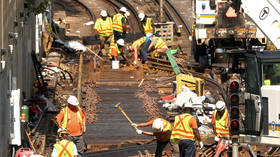The US could see its supply chain derailed

One of the United States’ largest rail unions rejected a deal with freight companies and, after a cooling-off period that expires on December 9, the country could see a rail strike that could collapse its supply chain ahead of the holiday season. The cost to the US economy could be about $2 billion per day and passenger rails, like Amtrak, could see major disruptions.
A deal has appeared distant but Congress could still intervene to force one, based on Depression-era legislation. At present, the biggest sticking point to an agreement is paid sick leave and other quality-of-life issues that impact rail workers. A tentative deal struck earlier by President Joe Biden in September granted the largest wage increases in 50 years – that is, 14% raises with back pay and 24% raises over the course of five years, plus thousand-dollar cash bonuses every year – but this was never the main sticking point.
Instead, unions are upset by a lack of sick leave and personal time that leaves rail workers with a permanent threat of termination over visits to a doctor, as well as having to be on call seven days a week. They’re also ticked about workers having to operate rails solo, which they deem a safety concern, given the long hours associated with the industry. That’s why unions voted narrowly to reject the deal, even if it saw a large pay bump.
While this issue has been boiling for many years, the pandemic brought scheduling issues to the fore. Successive waves of Covid-19 didn’t see any meaningful worker protections or paid sick leave implemented, and staffing shortages only worsened. Workers were forced to show up and be on call without any protections and, to top it off, the freight lines saw record profits deposited to the ultra-wealthy, such as Berkshire Hathaway Chairman Warren Buffett.
Despite those record profits and revenues, rail operators did not spread this wealth to employees or amend contracts to grant more benefits. Instead, they spent these lavish profits on stock buybacks and dividend payouts to shareholders. For example, CSX reported a 37% surge in fiscal year 2021 net income and the company repurchased $3.7 billion worth of its own shares during the first three quarters of this year to artificially boost stock prices.
And now the industry is hoping that Congress will intervene to kneecap workers. One of the main legal hurdles to a rail strike is the 1926 Railway Labor Act, which forbids workers from striking, unlike in most other businesses. This has significantly reduced the leverage of rail workers, while entrenching the powerful people that own the freight lines and raising the odds that Congress will intervene with a deal that unions would otherwise not have accepted.
That does appear to be the goal of the rail lobby. Unions are hoping that pro-union members of the lame-duck Congress won’t intervene on employers’ behalf but the economic damage could be too much to stomach. Up to 30% of all cargo could be strung up in the event of a strike, causing all sorts of items, from fuel to cars, to rise significantly in price, thanks to supply-chain hiccups. Freight lines are hoping that even a divided Congress will intervene to give them a favorable deal.
But this would be foolhardy and would only kick the can down the road. Congress should not damage the leverage of unions and should let the strike unfold, even if that means seeing huge price increases. The rail industry has seen sky-high profits and used anti-competitive practices to profiteer off of pandemic-induced supply bottlenecks. It also enjoys unparalleled antitrust law exemptions and benefits from the country’s privatization model around railroads.
On the contrary, Congress should take the chance to break up rail companies, strengthen anti-monopoly laws and implement universal paid sick leave, given the fact that the US is enduring a virtual case plateau with Covid-19. The US is, notably, one of the few developed countries in the world to not have universal paid sick leave and does not have a government-owned or subsidized rail competitor besides Amtrak.
This means that only a handful of companies are allowed to control entire freight lines and set arbitrary fees, which has resulted in numerous lawsuits, though current laws shield railways from any liability. Congress should displace the rail industry from its privileged position even if it is important for the national supply chain because, inevitably, these monopolies are damaging the market and hurting workers’ livelihoods
The statements, views and opinions expressed in this column are solely those of the author and do not necessarily represent those of RT.















